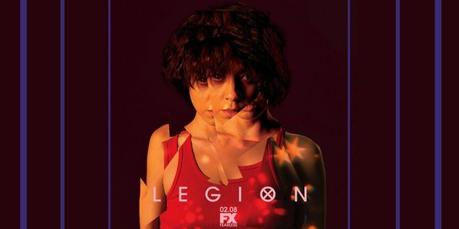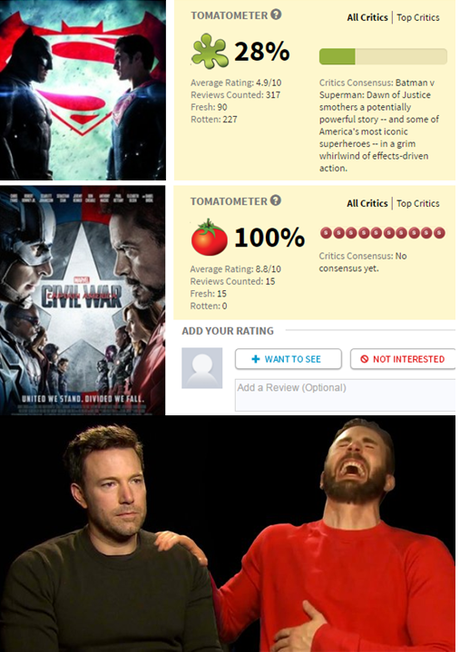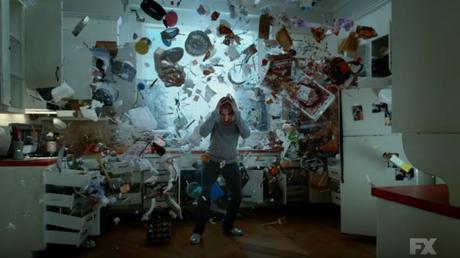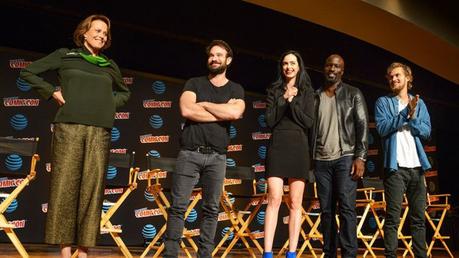
Remember how much fun the internet had last year posting memes comparing the wildly differing RottenTomatoes scores for Batman v Superman and Captain America: Civil War?

Hahaha. Suck it, WB. Your comic book movies are terrible. Marvel rules, DC drools.
Yeah, karma's a bitch:

vs.

Before you say it, yes, I know this situation isn't quite the same. We're not even really talking about the same two companies. Legion is a 20th Century Fox product whereas Iron Fist comes from Marvel Television, which makes the Netflix shows and has no operational overlap with Marvel Studios meaning it has nothing to do with the movies. Batman v Superman producer WB doesn't even factor into this discussion (they're content to slowly overtake the CW and keep Lucifer and Gotham going on Fox).
Moreover, it was only natural to compare Batman v Superman and Civil War considering their similar "hero vs. hero" marketing hooks as well as their release date proximity, with Civil War coming out just a month after BvS. The only reason to compare Iron Fist and Legion is simply because the former drops on Netflix in around 15 hours and the latter was just renewed for a second season yesterday, meaning they are each enjoying a Twitter-trending pop culture moment.

As such, it's vaguely interesting to pause and note that Iron Fist apparently sucks while Legion is the greatest thing in the history of anything ever in the world (and that's me actually holding back with my praise, as I'm riding high on this show after binge-watching its most recent 4 episodes yesterday). In the movie/TV nerd version of scoreboard watching we are more accustomed to seeing anything from Marvel Studios or Marvel Television tower over the competition in critical acclaim. Iron Fist, however, represents a stark reversal of fortune, a creative lowpoint. Iron Fist star Finn Jones is the one who should be made to listen to "The Sound of Silence" in internet memes (ala sad, then-rehab-bound Affleck) while Legion's Dan Stevens gets to laugh it up on talk shows (partially because he's also out there promoting his role as the titular Beast in Beauty and the Beast).
But this odd coincidence of timing has afforded us the chance to properly appreciate the potentially transitional moment before us. Iron Fist and its "rich, presumed-dead kid returns from mysterious exile in the Orient to reclaim his family's fortune, ends up fighting a bunch of ninjas" narrative is exactly like everything we've already seen before, a rote mixture of Batman Begins, Arrow season 1, Doctor Strange and Daredevil season 2; Legion, on the other hand, is a unique little butterfly, unlike anything ever attempted before in the superhero film or TV game. What if the most powerful mutant in the world had been raised to believe he was schizophrenic, and then found he wasn't...and then found out that while he does have powers he still might also be crazy? The result is a brilliantly self-assured series where reality is as fluid as it is to the main character.


Iron Fist seems duty bound to stay on brand whereas Legion triumphantly says "fuck brands" and veers off into the increasingly dark corners of its schizophrenic protagonist's mind. Legion recently saw fit to pull a "Hush" (from Buffy the Vampire Slayer) and drape complete silence over a climactic battle between the heroes and the surprise big bad at a scary house with mysterious monsters lurking in the shadows, and then the next episode was a riff on One Flew Over the Cuckoo's Nest because, really, why the heck not. It's a show more likely to remind you of the works of Kubrick, Lynch and Wes Anderson than the X-Men comic book legwork put in by Lee, Kirby and Len Wein.

It's hardly a unique observation to call Iron Fist overly familiar and Legion refreshingly different. Plus, "familiar" doesn't automatically equal bad just as "different" isn't a rubber stamp for awesomeness. However, it does give the impression that with Iron Fist and Legion we are simultaneously glimpsing the past and future of superhero storytelling. Iron Fist is the work of a company which has at least briefly lost touch with what it made it so special in the first place, vying for the familiar instead of the new; Legion is part of a killer trifecta of Fox titles (bracketed by Deadpool's traditional origin story wrapped up in meta, R-Rated clothing and James Mangold's revelatory, arguably Oscar-caliber Logan) which indicate the X-Men franchise is re-taking the mantle of most innovative player in superhero cinema, a title it first claimed back in 2000 but lost somewhere in-between X2 and The Last Stand.
However, look back up at that RottenTomatoes screencrab for Iron Fist. Despite the terrible reviews, 92% of readers still want to watch the show. Conversely, despite Legion's glowing word-of-mouth and season 2 renewal it remains little-watched ( even after DVR), at least in comparison to Ryan Murphy's various anthology shows which pepper FX's line-up or even Hawley's own Fargo. We'll likely never know how many people actually watch Iron Fist, but if the show fails to meet Netflix's benchmarks it won't really matter because everyone will come back to the fold in a couple of months to watch Daredevil, Jessica, Luke and the gang team up in The Defenders. Iron Fist failing is unlikely to have any noticeable impact on the state of superhero cinema (although it might force Marvel to fast-track something focused on an Asian hero). If Legion had failed, though, it would have discouraged such experimentation.

Can Legion, then, really be called the future of superhero TV? It's perhaps what the future should look like for those of us obsessives who have burnt out on the same ol', same ol'. In truth, the future - ABC"s Inhumans, CW's Black Lightning, Hulu's The Runaways, Freeform's Cloak and Dagger, Netflix's Punisher, Fox's mystery X-Men project with Bryan Singer as producer - might not be as rich with innovation as we'd like to believe.
Vulture's Abraham Reisman said of Iron Fist that "superhero fiction needs to change or die" and that "reimagination is just as important as imagination in superhero fiction. It's time to stop fearing it." But how many Noah Hawley's are going to come along to blow up the paradigm? Moreover, how many studios/networks will trust the Hawley-types to pursue an auteur vision which might have an inherently limited audience? Before this Iron Fist fiasco, Netflix used to receive that same kind of Legion-esque praise for Daredevil, Jessica Jones and Luke Cage, yet the only noticeable impact those shows had on the wider superhero TV spectrum was Arrow attempted to up its fight scenes and Agents of SHIELD basically used Ghost Rider the same way Daredevil season 2 used The Punisher. Plus, the eye-opening success of Daredevil served as a proof-of-concept which attracted plenty of talent to Jessica Jones and Luke Cage.
Maybe that's what Legion is: a proof-of-concept experiment that won't kill off the old order over night but will gradually inspire others to innovate and advance the form. Who knows, maybe one of these innovators will manage to get a Moon Girl and Devil DinosaurTV show made.
Are you watching Legion? If so, are you as hooked as I am? Do you wish more shows could follow in its footsteps, or is there plenty of space on the comic book TV show dial for the same ol', same ol's to rub shoulders with the innovators?

